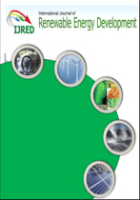
International Journal of Renewable Energy Development-IJRED
Scope & Guideline
Advancing Renewable Energy Research for Global Impact
Introduction
Aims and Scopes
- Renewable Energy Technologies:
The journal publishes research on various renewable energy technologies, including solar, wind, biomass, geothermal, and hydropower, focusing on their development, optimization, and integration into existing energy systems. - Sustainability and Environmental Impact:
IJRED emphasizes studies that assess the sustainability of energy solutions, particularly their environmental impacts, lifecycle analysis, and contributions to reducing carbon footprints. - Energy Efficiency and Management:
Research on energy efficiency improvements, demand-side management, and innovative energy management systems is a key area, highlighting strategies for optimizing energy use in various sectors. - Economic and Policy Analysis:
The journal features analyses that evaluate the economic viability and policy frameworks supporting renewable energy deployment, including investment strategies and regulatory impacts. - Emerging Technologies and Innovations:
IJRED encourages submissions on cutting-edge technologies and innovative approaches in renewable energy, including the application of machine learning and artificial intelligence in energy systems. - Interdisciplinary Approaches:
The journal promotes interdisciplinary research that combines engineering, environmental science, economics, and social sciences to address complex energy challenges.
Trending and Emerging
- Hybrid Energy Systems:
Research on hybrid energy systems that integrate multiple renewable sources (e.g., solar-wind-storage) is increasingly prominent, as these systems offer enhanced reliability and efficiency. - Artificial Intelligence in Energy Management:
The application of AI and machine learning techniques for predictive analytics, optimization, and efficient energy management is rapidly growing, reflecting a broader trend towards data-driven solutions. - Techno-Economic and Environmental Assessments:
Comprehensive assessments that combine techno-economic feasibility with environmental impact analysis are gaining importance, as stakeholders demand more holistic evaluations of renewable energy projects. - Energy Storage Solutions:
Innovations in energy storage technologies, particularly in the context of intermittent renewable sources, are becoming a focal point, addressing challenges related to energy reliability and grid integration. - Sustainable Urban Energy Systems:
Research focusing on sustainable energy solutions for urban environments, including smart grids and energy-efficient building designs, is trending as cities aim to reduce their carbon footprints. - Life Cycle Assessment and Circular Economy:
Studies employing life cycle assessment methodologies to evaluate the sustainability of renewable energy technologies and their alignment with circular economy principles are increasingly featured.
Declining or Waning
- Traditional Biomass Utilization:
While biomass remains a crucial renewable energy source, research focused solely on traditional biomass utilization methods has decreased, giving way to more advanced conversion technologies. - Conventional Energy Systems:
There is a noticeable reduction in studies centered on conventional energy systems, as the journal increasingly prioritizes research on innovative renewable solutions and hybrid systems. - Basic Energy Policy Studies:
Research that merely describes existing energy policies without proposing new frameworks or improvements is becoming less common, as there is a shift towards more analytical and prescriptive policy studies. - Single-Fuel Energy Systems:
The focus on single-fuel energy systems is waning, with a growing interest in integrated and hybrid systems that combine multiple renewable sources for enhanced efficiency and reliability. - Localized Case Studies:
While localized case studies were once prevalent, there seems to be a decline in their frequency, as researchers are now more inclined to conduct comparative studies or meta-analyses that draw broader conclusions.
Similar Journals

Problemele Energeticii Regionale
Transforming Energy Discourse through Open Access KnowledgeProblemele Energeticii Regionale is a notable academic journal focused on the field of energy engineering and sustainable energy solutions, published by the Institute of Power Engineering, Academy of Sciences of Moldova. Since its inception in 2005, this Open Access journal has become a significant platform for disseminating research and innovations in various energy-related domains, including renewable solutions, fuel technology, and energy sustainability. While its impact factor metrics suggest it currently resides in the Q4 quartile category across multiple scopes—such as Energy Engineering, Power Technology, and Renewable Energy—it provides critical insights that can pave the way for advancements in regional energy challenges. Researchers, professionals, and students alike will find this journal an essential resource for understanding and contributing to the ongoing discourse in the energy sector. With its commitment to accessibility and knowledge sharing, Problemele Energeticii Regionale aims to foster a collaborative and informed community focused on energy innovation and sustainability.
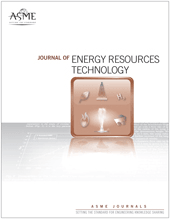
JOURNAL OF ENERGY RESOURCES TECHNOLOGY-TRANSACTIONS OF THE ASME
Fostering collaboration in the realm of energy advancements.JOURNAL OF ENERGY RESOURCES TECHNOLOGY-TRANSACTIONS OF THE ASME is a prestigious journal dedicated to advancing the knowledge and application of energy resources technology across various disciplines. Published by the American Society of Mechanical Engineers (ASME), this journal plays a critical role in fostering innovative research within energy engineering, fuel technology, geochemistry, and mechanical engineering, evidenced by its solid impact factor and commendable Scopus rankings, including a Q1 ranking in Mechanical Engineering. The journal's comprehensive scope covers a wide array of subjects, from renewable energy solutions to sustainability practices, making it an essential platform for researchers, professionals, and students eager to contribute to and stay abreast of developments in the energy sector. With an impressive convergence history dating back to 1979, it continues to uphold rigorous academic standards and provides valuable insights into the latest technological advancements and methodologies relevant to the field. While the journal does not offer open access options, it is unequivocally a vital resource for those engaged in cutting-edge energy research.

Green Energy & Environment
Empowering Sustainable Solutions for a Greener Tomorrow.Green Energy & Environment, published by KEAI PUBLISHING LTD, stands as a pioneering journal dedicated to the dynamic fields of renewable energy, sustainability, and environmental science. With its ISSN 2096-2797 and E-ISSN 2468-0257, this Q1 journal holds a noteworthy presence in academic discourse, reflecting its high-quality contributions within these critical areas of research. Launched in 2016, it has consistently embraced an Open Access model, facilitating unhindered access to research findings and fostering collaboration across global communities. Based in Beijing, China, this journal is dedicated to disseminating innovative insights that are essential for addressing urgent global challenges related to energy and environmental sustainability. Researchers, professionals, and students alike benefit from a platform that not only showcases pioneering research but also encourages interdisciplinary dialogue and knowledge exchange in the pursuit of a sustainable future.
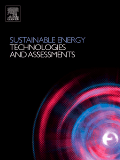
Sustainable Energy Technologies and Assessments
Driving Progress in Sustainable Energy TechnologiesSustainable Energy Technologies and Assessments is a prestigious journal published by ELSEVIER, based in the United Kingdom, focusing on the critical field of energy engineering and its intersection with sustainability. Since its inception in 2013, the journal has established itself as a leading platform for disseminating innovative research and assessments of sustainable energy technologies, earning a notable Q1 ranking in both Energy Engineering and Power Technology, as well as Renewable Energy, Sustainability, and the Environment. With an impressive Scopus ranking—#22 out of 272 in Energy Engineering and #40 out of 270 in Renewable Energy—this journal is essential for researchers and professionals seeking to advance their knowledge on cutting-edge developments and assessments in sustainable energy. Although the journal operates on a subscription basis, it remains committed to promoting high-quality research that aligns with global sustainability objectives. Researchers and students alike will find invaluable insights and data that shape the future of renewable energy technologies within these pages.
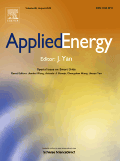
APPLIED ENERGY
Illuminating pathways to efficient energy practices.APPLIED ENERGY, published by Elsevier Science Ltd, is a leading journal dedicated to the advancing field of energy research, focusing on practical engineering solutions to contemporary challenges in energy management, sustainability, and environmental impact. With a rigorous peer-review process and a strong commitment to promoting innovative research, APPLIED ENERGY proudly holds multiple Q1 rankings across various categories, including Building and Construction, Civil and Structural Engineering, and Renewable Energy, reflecting its prestigious position within the academic community. Researchers and professionals can benefit from its comprehensive scope, covering topics that span from policy and technology to market dynamics. Although it is not an open-access journal, it provides access options that facilitate research dissemination. With its historical significance since 1975 and an ambitious outlook up to 2025, APPLIED ENERGY continues to be an essential resource for anyone looking to stay at the forefront of energy research and application.

AIMS Energy
Transforming Energy Challenges into Sustainable SolutionsAIMS Energy is a leading academic journal published by the American Institute of Mathematical Sciences (AIMS), dedicated to advancing the field of energy research. With a strong commitment to Open Access since its inception in 2013, this journal offers a platform for researchers, professionals, and students to share innovative findings and enrich the discourse in crucial areas such as Energy Engineering and Power Technology, Fuel Technology, and Renewable Energy, Sustainability and the Environment. Recognized for its quality, AIMS Energy holds a respectable impact with a Q3 ranking in multiple categories as of 2023, and it ranks within the top half of its peers in the Scopus database. The journal's objective is to disseminate high-quality research that addresses contemporary challenges in energy and offers sustainable solutions. By fostering collaboration and discussion among various stakeholders, AIMS Energy plays a critical role in shaping the future of energy technologies and policies.

Advances in Applied Energy
Exploring the Future of Energy Applications.Advances in Applied Energy is an esteemed academic journal published by Elsevier, focusing on the dynamic and interdisciplinary field of energy applications. With its ISSN 2666-7924 and esteemed open access model initiated in 2021, this journal has rapidly emerged as a prominent platform for disseminating cutting-edge energy research, especially noted for its robust ranking as Q1 in Energy (miscellaneous) in 2023. Situated in the vibrant academic landscape of the United Kingdom, it serves as a global hub for thought leaders and innovators, evidenced by its impressive ranking as #3 out of 73 in the Scopus Ranks for General Energy, placing it within the 96th percentile in the field. This journal aims to foster collaboration, innovation, and knowledge transfer between researchers, professionals, and students, ensuring that critical advancements in energy technologies are readily available to a wide audience. Its commitment to high-quality research and accessibility further underscores its importance in shaping the future of sustainable energy solutions.

Progress in Energy
Leading the Charge in Energy Research and DevelopmentProgress in Energy, published by IOP Publishing Ltd, is an esteemed open-access journal that focuses on cutting-edge research in the field of energy. With its e-ISSN 2516-1083, this journal stands out for its commitment to disseminating high-quality articles that aim to advance the understanding and application of energy technologies and policies. Juggling respectably in the academic arena, it proudly holds a Q1 classification in the energy (miscellaneous) category and ranks 6th out of 73 in the general energy sector, placing it in the top 92nd percentile among its peers, according to Scopus metrics. The journal's scope encompasses a wide range of topics, including renewable energy, energy efficiency, and policy analysis, making it a vital resource for researchers, industry professionals, and students alike. With a publication horizon extending from 2019 to 2024, Progress in Energy invites contributions that push the boundaries of knowledge in energy fundamentals and innovations.
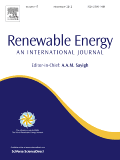
Renewable Energy
Innovating Tomorrow's Energy Solutions.Renewable Energy is a prestigious international journal published by PERGAMON-ELSEVIER SCIENCE LTD, dedicated to advancing the field of renewable energy technologies and their applications. Since its inception in 1991, this journal has provided a critical platform for researchers, professionals, and students to explore innovative solutions in renewable energy, sustainability, and environmental protection. With an impressive impact factor and ranked in the top quartile (Q1) of its category, Renewable Energy is recognized for its high-quality, peer-reviewed research that significantly contributes to the scientific and professional discourse in the sector. The journal is indexed in Scopus, holding an esteemed rank of #21 out of 270 in its field, underscoring its influence and reach. Researchers can access the journal’s articles through traditional subscriptions, ensuring a broad dissemination of vital knowledge that supports the global transition to sustainable energy sources. Addressed from its headquarters in Oxford, England, Renewable Energy is crucial for anyone involved in the journey towards a sustainable future, fostering collaboration and innovation in a critical area of environmental science.
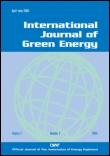
International Journal of Green Energy
Championing innovative research in the realm of sustainability.The International Journal of Green Energy is a premier publication that plays a pivotal role in the field of renewable energy and sustainability. Published by Taylor & Francis Inc, this journal, with ISSN 1543-5075 and E-ISSN 1543-5083, has established itself as a crucial platform for sharing innovative research and developments from 2005 to 2024. With a commendable Q2 ranking in the category of Renewable Energy, Sustainability and the Environment, it ranks 100 out of 270 in Scopus, positioning itself in the 63rd percentile of its field. The journal is dedicated to advancing knowledge and fostering dialogue around green technologies and sustainable practices, providing invaluable insights for researchers, industry professionals, and students alike. Although it does not offer open access options, the journal's commitment to rigorous peer review ensures that only high-quality research is published, making it an essential resource for those seeking to explore and understand the complexities of green energy solutions.